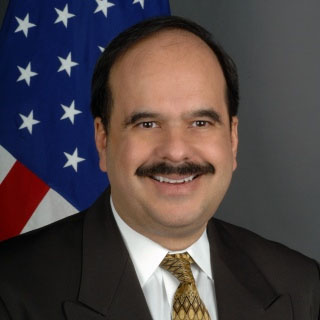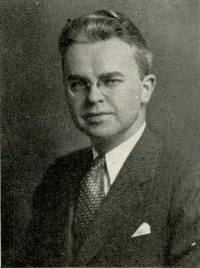
Robert William Fisk was an English writer and journalist. He was critical of United States foreign policy in the Middle East, and the Israeli government's treatment of Palestinians.

Patrick Oliver Cockburn is a journalist who has been a Middle East correspondent for the Financial Times since 1979 and, from 1990, The Independent. He has also worked as a correspondent in Moscow and Washington and is a frequent contributor to the London Review of Books.
Richard W. Bulliet is a professor emeritus of Middle Eastern history at Columbia University who specializes in the history of Islamic society and institutions, the history of technology, and the history of the role of animals in human society.

William Eldridge Odom was a United States Army lieutenant general who served as Director of the National Security Agency under President Ronald Reagan, which culminated a 31-year career in military intelligence, mainly specializing in matters relating to the Soviet Union. After his retirement from the military, he became a think tank policy expert and a university professor and became known for his outspoken criticism of the Iraq War and warrantless wiretapping of American citizens. He died of an apparent heart attack at his vacation home in Lincoln, Vermont.
Kenneth R. Timmerman is a political writer and conservative activist.

John Thomas Alderdice, Baron Alderdice is a Northern Ireland politician. He was the Speaker and a Member of the Northern Ireland Assembly (MLA) for East Belfast from 1998 to 2004 and 1998 to 2003, respectively. Alderdice was the leader of the Alliance Party of Northern Ireland from 1987 to 1998, and since 1996 has sat in the House of Lords as a Liberal Democrat.
Hossein Bashiriyeh, is an Iranian scholar in political theory and political sociology, who was born in 1953 in Hamedan, Iran.

Abdul Aziz Said was Professor Emeritus of International Relations in the School of International Service at American University, Washington, D.C. He was the founding Director of the university's International Peace and Conflict Resolution program. Said was viewed as a trailblazer in his field. Well known for shifting the focus of International Relations theory from real politic-based on the concept that the law of power governs states, to new world order theories based on cooperation and common security. Starting in the late 1980s Said increasingly focused his work on human rights, conflict resolution, and later explored the relationship between spirituality and religion in international politics.

The Royal Belfast Academical Institution is an independent grammar school in Belfast, Northern Ireland. With the support of Belfast's leading reformers and democrats, it opened its doors in 1814. Until 1849, when it was superseded by what today is Queen's University, the institution pioneered Belfast's first programme of collegiate education. Locally referred to as Inst, the modern school educates boys from ages 11 to 18. It is one of the eight Northern Irish schools represented on the Headmasters' and Headmistresses' Conference. The school occupies an 18-acre site in the centre of the city on which its first buildings were erected.
Simon Frederick Peter Halliday was an Irish writer and academic specialising in international relations and the Middle East, with particular reference to the Cold War, Iran, and the Arabian Peninsula.

Vali Reza Nasr is an Iranian-American academic and author, specializing in the Middle East and the Islamic world. He is Majid Khaddouri Professor of International Affairs and Middle East Studies at the Johns Hopkins School of Advanced International Studies (SAIS) in Washington, D.C. He served as the eighth dean of the school from 2012 to 2019. Nasr is also a Non-Resident Fellow in South Asia at Atlantic Council and is described by The Economist as "a leading world authority on Shia Islam".

Pan Guang is the Director of and Professor at the Shanghai Center for International Studies and Institute of European & Asian Studies at the Shanghai Academy of Social Sciences, Director of SCO Studies Center in Shanghai, Dean of Center of Jewish Studies Shanghai (CJSS), and Vice Chairman of the Chinese Society of Middle East Studies.

Alberto Miguel Fernandez is a Cuban-American former diplomat. He was the head of the Middle East Broadcasting Networks (MBN), which includes Alhurra. Fernandez is currently vice president of the Middle East Media Research Institute, a position he held 2015–2017. He is a member of the Madrid Forum, an international group of right-wing and far-right individuals organized by Vox.

Chibli Mallat is a Lebanese international lawyer, legal scholar, and a former candidate for presidency in Lebanon.
Padraig O'Malley is an Irish international peacemaker, author, and professor. O'Malley specializes in the problems of divided societies, such as South Africa and Northern Ireland. He has written extensively on these subjects and has been actively involved in promoting dialogue among representatives of differing factions. He is currently the John Joseph Moakley Distinguished Professor of Peace and Reconciliation at the University of Massachusetts Boston.

Edward Wadie Said was a Palestinian-American philosopher, academic, literary critic, and political activist. As a professor of literature at Columbia University, he was among the founders of post-colonial studies. As a cultural critic, Said is best known for his book Orientalism (1978), a foundational text which critiques the cultural representations that are the bases of Orientalism—how the Western world perceives the Orient. His model of textual analysis transformed the academic discourse of researchers in literary theory, literary criticism, and Middle Eastern studies.
Denis Liddell Ireland was an Irish essayist and political activist. A northern Protestant, after service in World War I he embraced the cause of Irish independence. He also advanced the social credit ideas of C. H. Douglas. In Belfast, his efforts to encourage Protestants in the exploration of Irish identity and interest were set back when in 1942 his Ulster Union Club was found to have been infiltrated by a successful recruiter for the Irish Republican Army. In Dublin, where he argued economic policy had failed to "see independence through," he entered Seanad Éireann, the Irish Senate, in 1948 for the republican and social-democratic Clann na Poblachta. He was the first member of the Oireachtas, the Irish Parliament, to be resident in Northern Ireland.
Thomas J. Moran was an American businessman, philanthropist, academic administrator, and humanitarian. At the time of his death, he was chairman emeritus of Mutual of America and the chancellor of Queen's University Belfast.
John T. “Jack” Skelly was a journalist who wrote for a number of news organizations focusing primarily on Latin America and served for a brief period in 1959 as Fidel Castro’s international press coordinator.

Walter Luke Willigan was an American historian, sociologist, and educator who taught at St. John's University for forty years.











